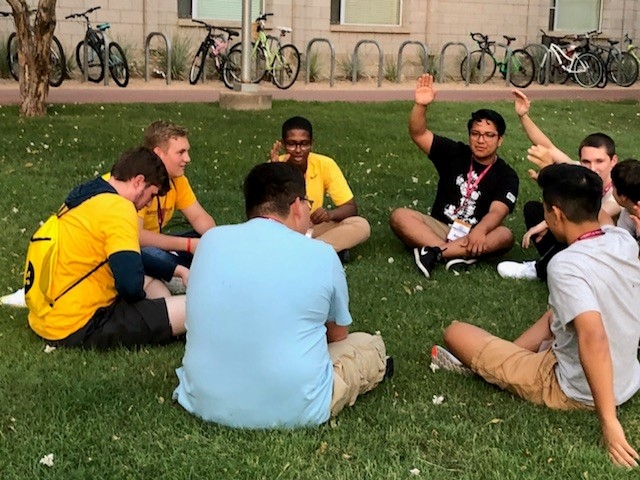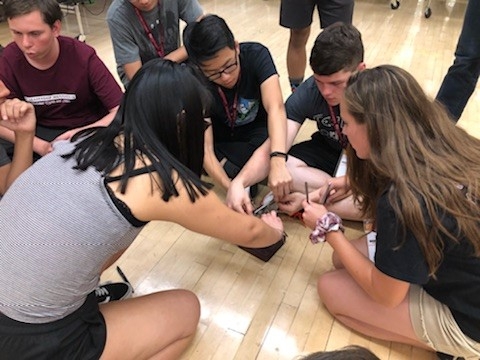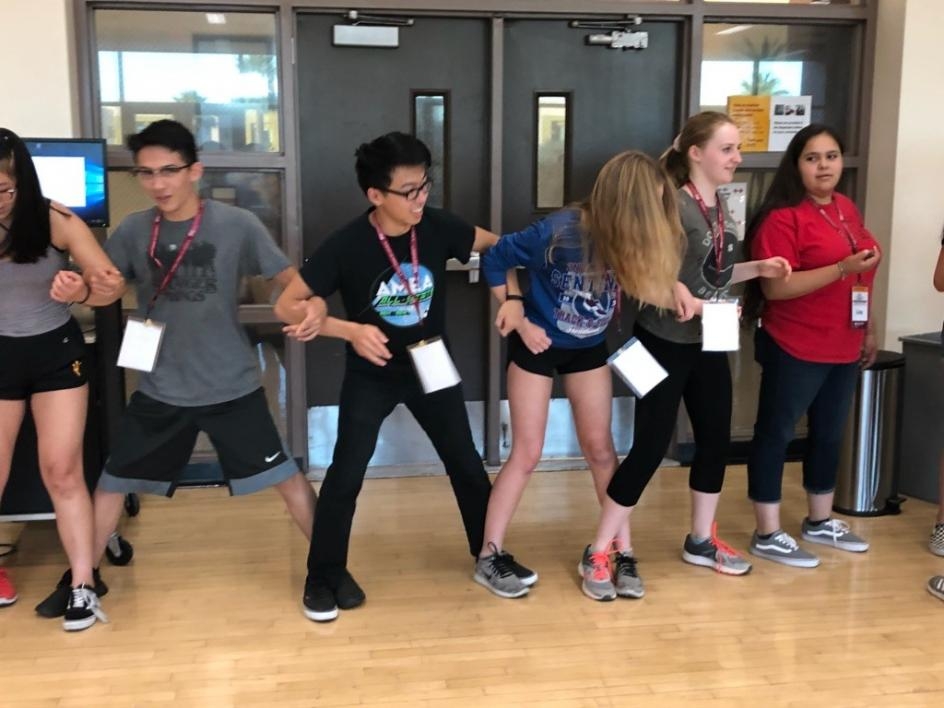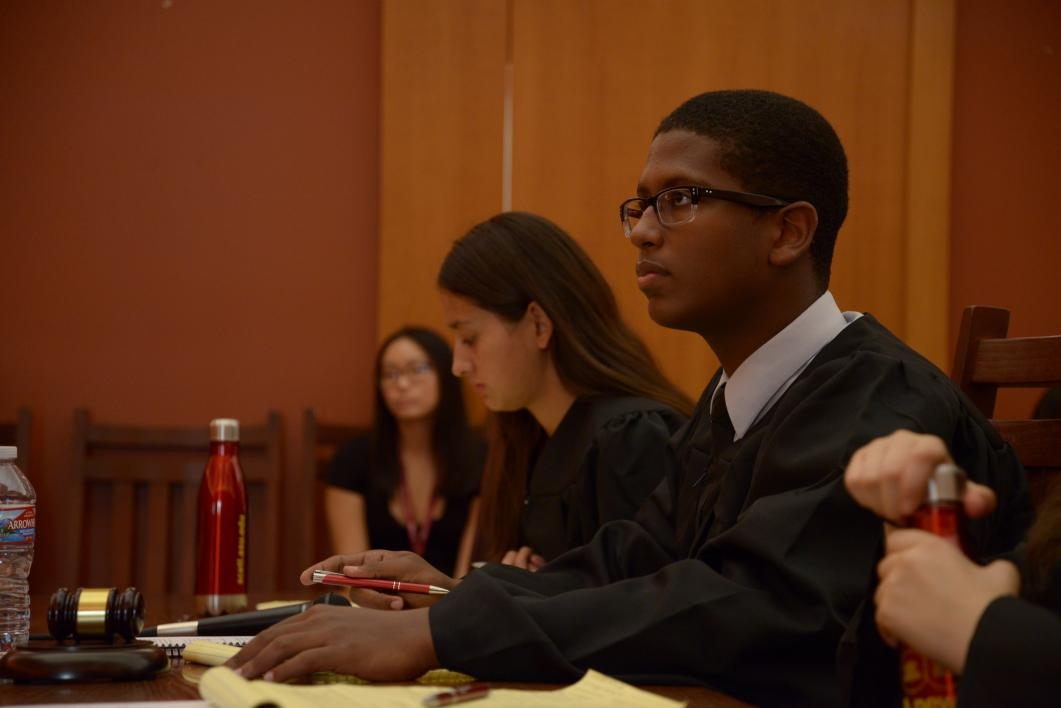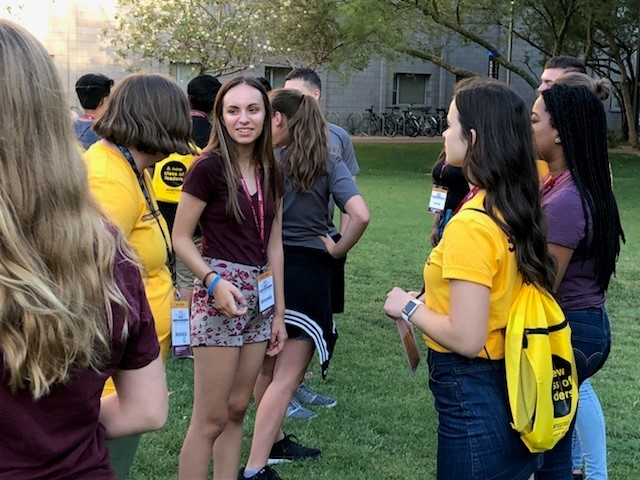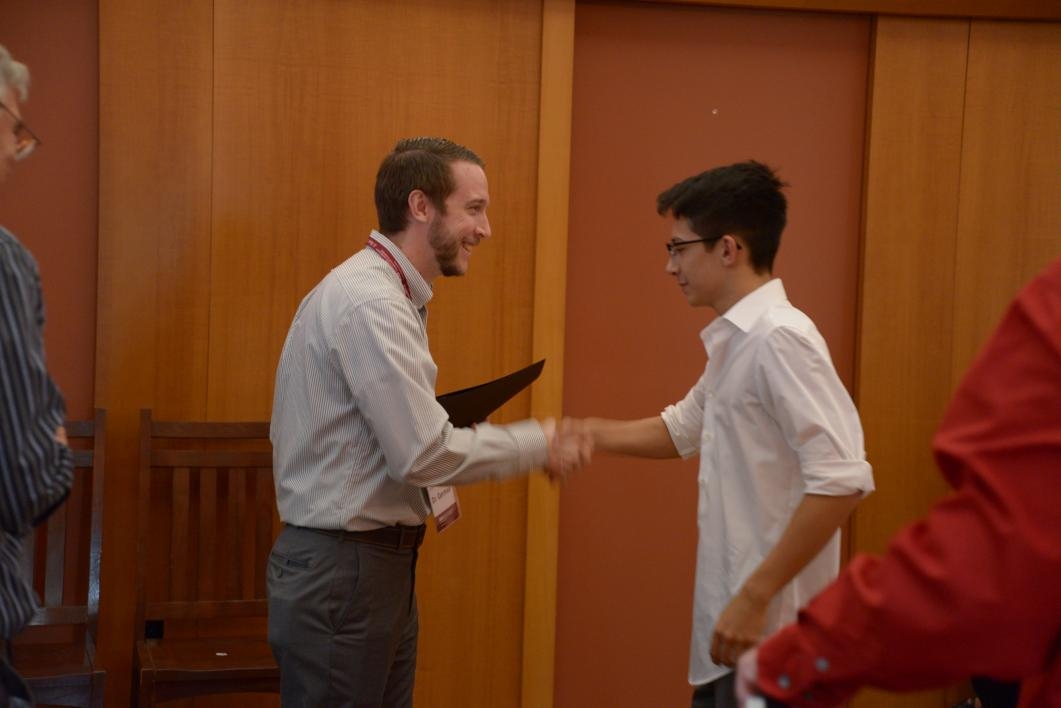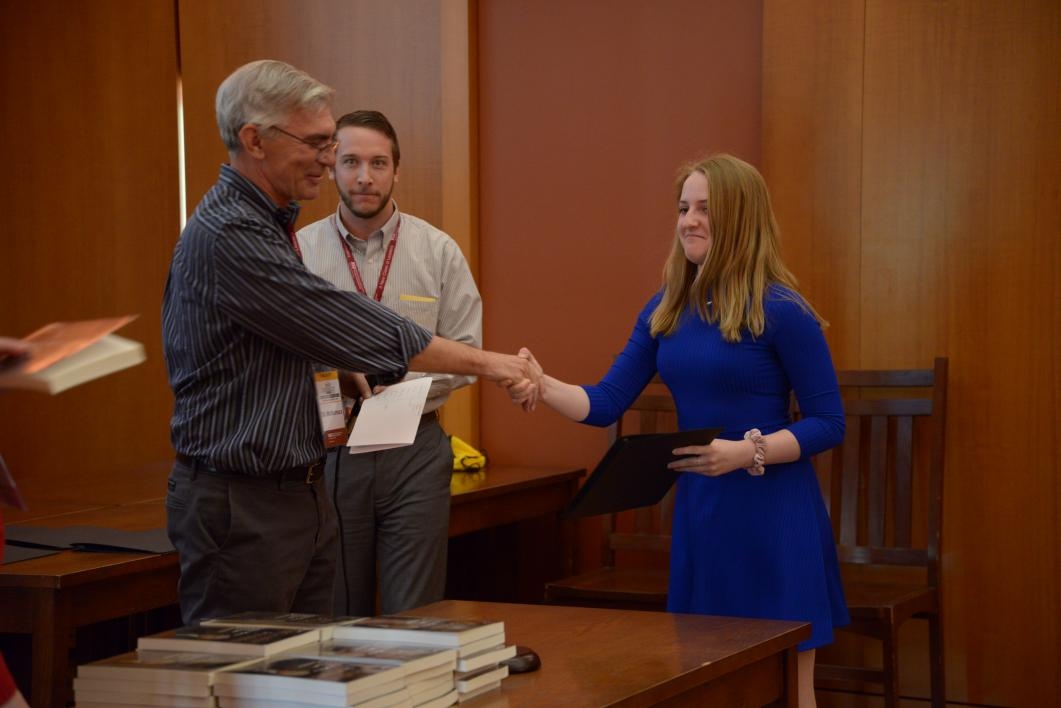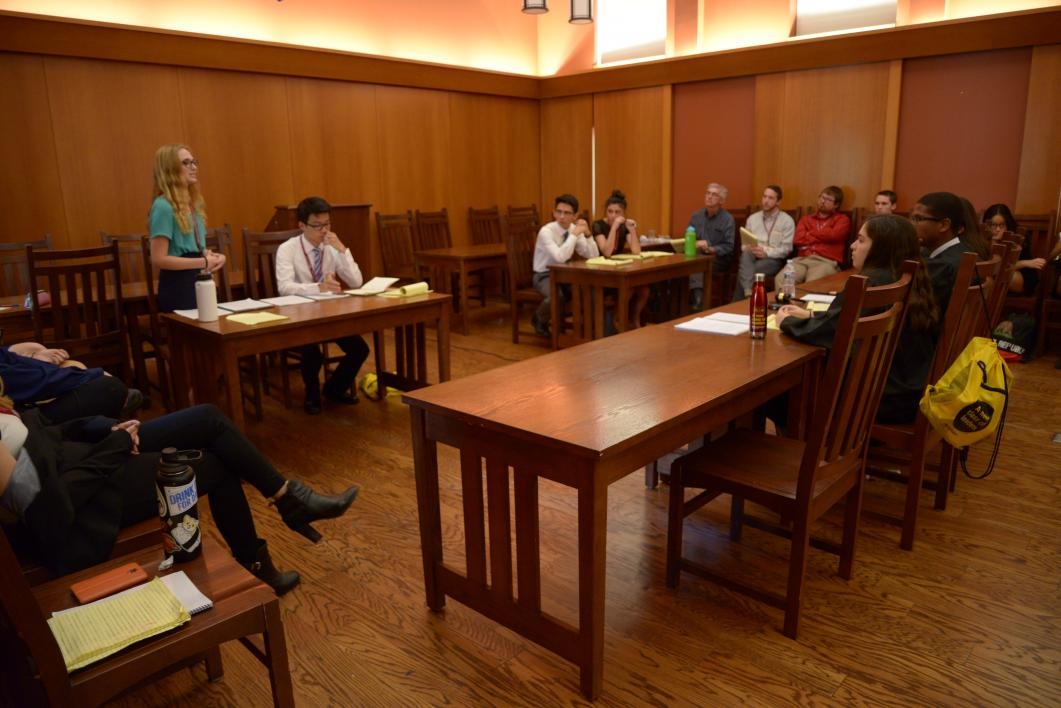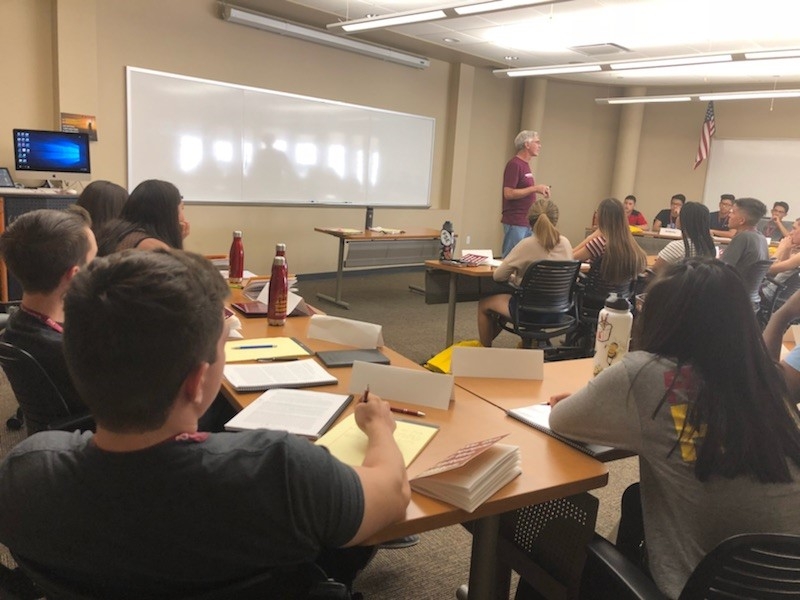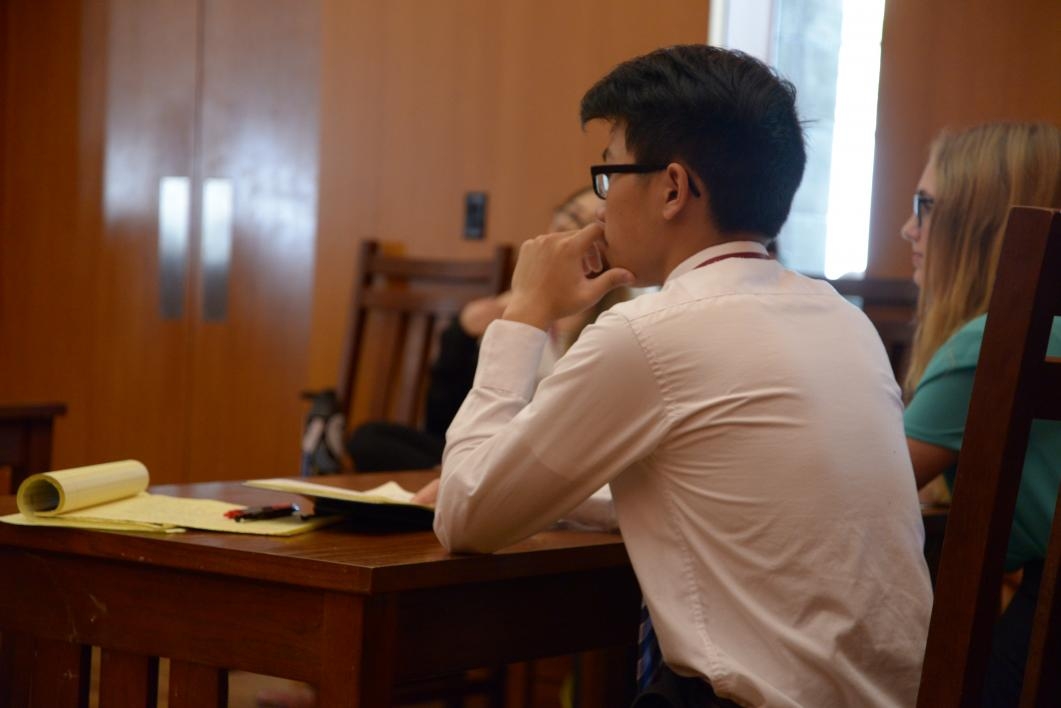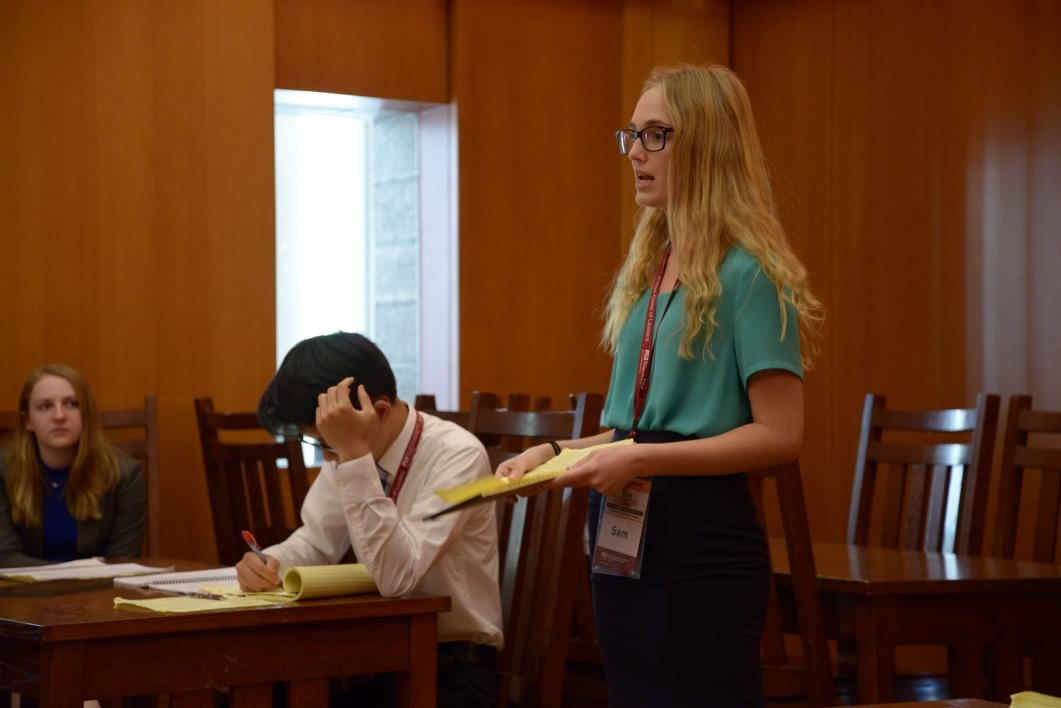ASU Civic Leadership Institute draws high-achieving high school students interested in U.S. Constitution, Bill of Rights
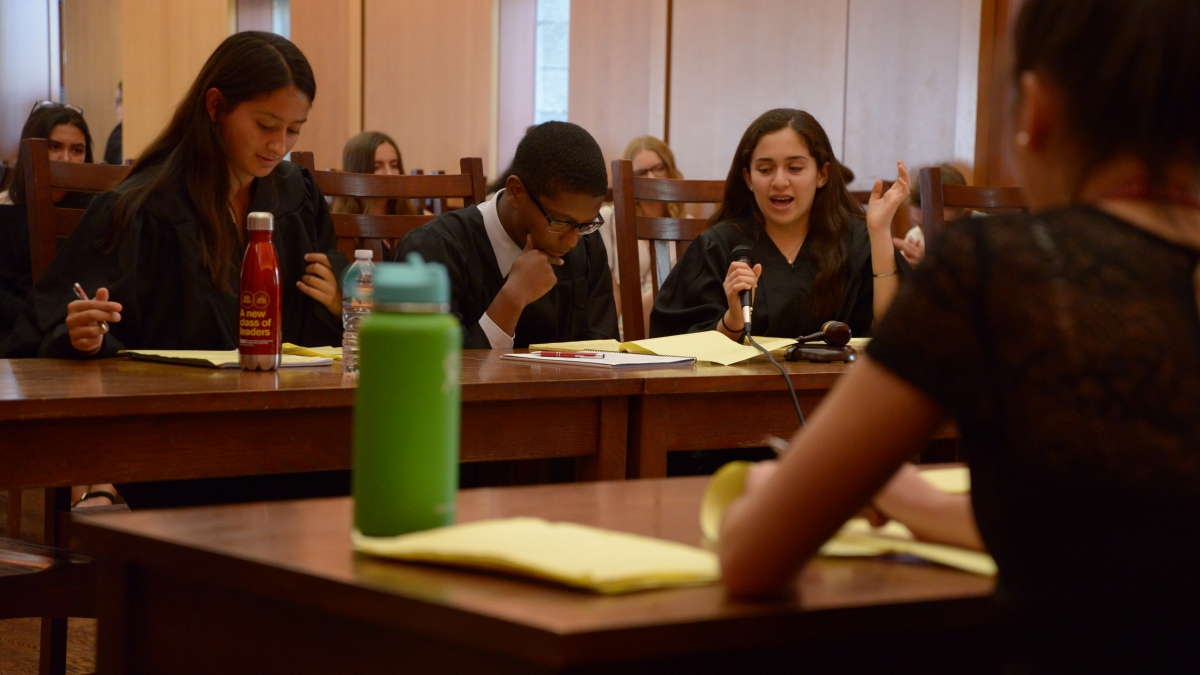
Civic Leadership Institute students deliberate a Supreme Court case. Photo courtesy Samantha Lloyd
It is noon on a Friday in the middle of June and most of the Barrett Honors College Complex is quiet.
But inside the refectory, known to students as “the Harry Potter room,” a dozen or so high school students dressed in suits pace up and down while reading aloud from yellow notepads. At the front of the room, three of their classmates are seated at a long table, dressed in sober black robes, while a dozen other students talkatively file in and find their seats. The crack of the gavel calls the room to attention, and the buzz of 32 teenagers quiets to a murmur.
With the poise and self-confidence of an attorney well-versed in appearing before the high court, Amanda Shuerman, a senior at Gilbert Classical Academy, addresses the audience.
“Mr. Chief Justice, and may it please the court.”
This moot court exercise is the culminating event of the Civic Leadership Institute, a weeklong summer program for high school students organized by faculty and staff of the School of Civic and Economic Thought and Leadership at Arizona State University.
Shuerman has been assigned the role of an American Civil Liberties Union attorney in a case known as McCreary County v. American Civil Liberties Union, and she is presenting an argument she has prepared for all week.
The aim of the institute, according to the school's Founding Director Paul Carrese, is to "introduce students to great debates about liberty, equality, natural rights, the rule of law, economic liberty and economic order, and other bedrock American principles — both as important ideas and to inculcate the civic virtue of reasonable debate.”
The institute is part of the school’s plan to join other ASU units and Arizona institutions committed to civic leadership in a mission to collaborate with K-12 leaders and teachers on reviving civic education.
“The institute allows SCETL to directly shape students as citizens and potential leaders in civil society or politics, and also allows us to develop relationships with teachers and schools,” said Carrese.
“These relationships are fundamental for the civic education curriculum we will be building for K-12 in the coming years because we need the expertise and viewpoints of school teachers and leaders about the right content and the best approaches for reaching today’s students.”
The theme of the inaugural institute was Constitutional Rights and Liberties, and course content focused on the Bill of Rights and the Fourteenth Amendment.
"We chose the Bill of Rights because it was a relatively easy way to connect students to a set of serious political and philosophical issues," said Professor Peter McNamara, who developed the curriculum alongside Professors Sean Beienburg and Zachary German, and postdoctoral fellow Jakub Voboril.
"Much of our public discourse today involves constitutional rights and liberties," said German.
"For example, think about our debates over whether hate speech should be a protected form of free speech, to what extent business owners’ religious beliefs, reflected in their business practices, are protected by the First Amendment, or whether the Second Amendment protects an individual right to own and carry firearms. We wanted to give these high-school students the opportunity to think about and discuss these important questions in a deeper, more thoughtful way, informed by American political thought and the Supreme Court’s jurisprudence on these issues."
The institute was made up of high school sophomores, juniors, and seniors interested in leadership, and the materials and lectures were delivered at a college level. Given the recent surge in civic engagement from high school students all over the country, it is not surprising that these high-achieving students were up to the task.
"The energy of the students was great. It was a long hard week. But they stuck it out," said McNamara.
Student Success Coordinator Susan Kells, who planned the activities for the institute, agreed. "Their commitment to the academically rigorous content was impressive; several students regularly opted to read or work on their moot court cases during free time.”
Throughout the week, students dined, deliberated, and debated together in a high-impact learning environment that mirrors the college curriculum in the school. All 32 students sat in on short lectures, then broke into small groups to discuss important Supreme Court cases and the constitutional rights they addressed.
They also trained themselves for extemporaneous speaking and debate with their peers, a nerve-wracking but invaluable exercise that requires finding evidence to support arguments, mastering rhetorical devices and in some cases, overcoming stage fright. They also analyzed the work of great leaders after which they would model their own arguments.
"Another pillar for our school is to emphasize that American civic ideals are admirable but human,” said Carrese. “Always debated, always open to the charge of needing improvement or reform; so we introduce students to great leaders, great exemplars of American civic service and debate, so that they have models to follow when developing their own plans for leadership and service.”
"This week I feel like I’ve learned so much," said Shuerman.
"You learn that in order to protect your rights, you have to really be an active citizen. You have to be able to read through the Constitution and to actually understand what it means and the implications of that for our country."
Litzy Hernandez, a junior from Agua Fria High School, added, "I now know what my rights are and how to defend them, and I know why the Constitution protects those rights.”
In learning about Supreme Court cases, the students’ close study of the Constitution made it clear that different readings can yield drastically different results.
“Something as simple as a comma can completely change somebody’s interpretation of a sentence,” ASU Preparatory Academy student Alejandro Shomar-Esparza commented.
As happens with most issues related to public policy, the students wrestled with a lot of opposing opinions. They argued about gun control and the death penalty, but the conversations inside the classroom, while at times serious and highly charged, maintained a level of mutual respect that impressed the faculty.
"We tackled some controversial issues — the Second Amendment, affirmative action, the meaning of free speech, the meaning of freedom of religion," said German.
"These students spend a lot of time on social media, where civil discourse often goes to die. But they were respectful of each other’s opinions, and they engaged with each other at the level of ideas and reasons. Our public discourse might be a lot healthier if it looked and sounded more like the student discussions that took place during the institute.”
"What I appreciated about this was that there were so many different points of view,” said Ian Kraemer, a student at Glendale Preparatory Academy. "We all have different educational backgrounds and different societal and socio-economic backgrounds. The diversity that's added is just invaluable.”
Shuerman agreed. "A sort of camp like this tends to attract people that have very strong opinions and so the fact that we could all express our opinions and have discussions and discourse about this while still remaining civil and expressing our opinions in a way that wasn’t necessarily emotionally charged — I think it was really incredible that a group of students could come together like that.”
Most of the students agreed that the rest of the country is having trouble doing the same, resulting in a contentious, divided political landscape that stymies progress.
What do the students think is the problem? For a majority of them, the answer is simple: We just don't listen to each other.
Video by Samantha Lloyd and Ty Fishkind
Yet, in spite of the often angry tone of contemporary politics, some of the students at the institute seemed optimistic.
"We need to acknowledge diversity of thought and opinion because that's what makes the United States so unique. If we value that more, we'll progress more," said Hamilton High School student Nivea Krishnan.
Other students, though, had their doubts.
When asked whether he thought the country could find its way out of extreme polarization, Mountain Ridge High School student Anthony Ruen was skeptical.
"We don't have an absolute truth, and without an absolute truth, it's pretty much impossible to decide on common ground that everyone can universally agree upon.”
Carrese believes that one benefit of good civic education is that it can remind students that compromise is, in fact, possible.
“Teachers, parents, and civic leaders should always look for examples of civic friendship and civil, reasonable disagreement when talking with students who are discouraged by America’s angry polarization and our failures to achieve compromised polices on our major national problems,” Carrese said. “There are both historical and current-day exemplars of these civic virtues; they aren’t mythical, like unicorns or superheroes; and they are in both parties, both liberals and conservatives, both national and local, in elected office and in other public roles.”
While the week was full of challenging readings, vigorous class debates, and lots of study time, this young intellectual community got to relax and have some fun too.
They watched a movie, hiked "A" Mountain, played pool in Sparky's Den, participated in a team challenge at the ASU Fitness Center, and ended the week with a pool party and awards ceremony.
When asked if he thought he would use anything he learned after leaving the institute, Kraemer said yes.
"I just turned 18 a little while ago so I get to vote. As of right now, I'm feeling more confident and informed about that."
For more photos from the week, visit the Civic Leadership Institute facebook album.


